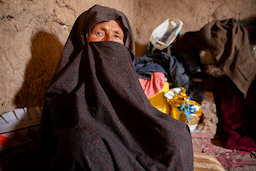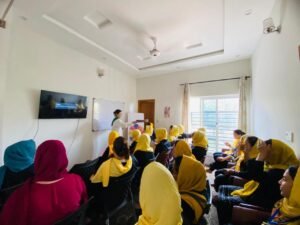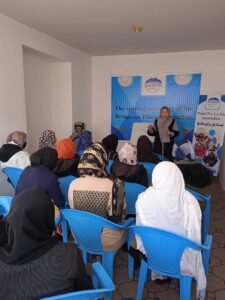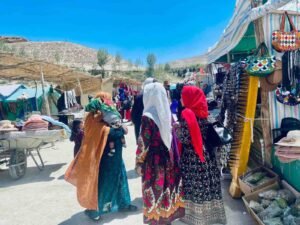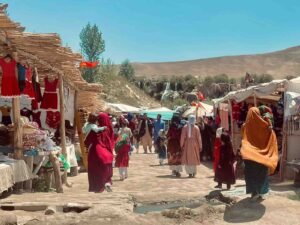The Deafening Silence of Afghan Women Echoes in Vienna’s Halls of Power
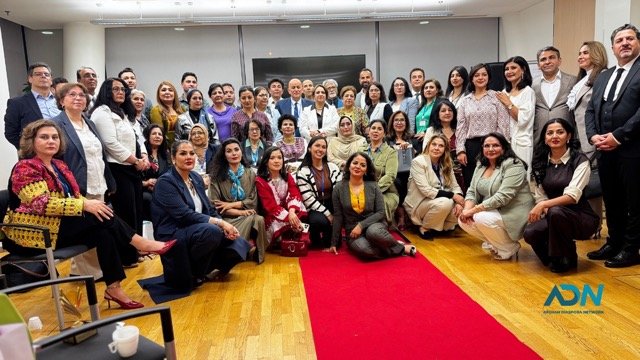
Group photo of the Afghan diaspora at the close of the conference organized by AKIS in Vienna. Photo by @Ali Ahmad
By Ali Ahmad
The grand marble halls of Vienna’s Rathaus (City Hall) have hosted countless diplomatic receptions, but none quite like this. On May 23, the gilded chambers echoed not only with polite diplomatic chatter, but also with the raw, urgent voices of Afghan women, and the men who stand with them, demanding that the world stop looking away from what they boldly call “gender apartheid.”
“In a time when the world is talking about Artificial Intelligence and traveling to Mars, Afghan women are still fighting for the basic right to education. We should be mad, we should be angry, we should shout, we should act,” said Afghan women’s rights activist Tahmina Salik.
The two-day event, titled “Against Gender Apartheid: Promoting Afghan Women and Girls through Education and Work,”was organized by the Afghan Cultural Association – AKIS, in cooperation with the Vienna Institute for International Dialogue and Cooperation (VIDC), the Vienna Chamber of Labor, and the Women’s Department of the Austrian Trade Union Federation (Gewerkschaftsfrauen).
The event also received support from the Austrian Development Cooperation. More than 100 Afghan women’s activists, representatives of Afghan diaspora organizations in Europe, former Afghan government officials, members of the Vienna City Council, diplomats, migrant counseling centers, and international organizations were in attendance.
Gender Apartheid: Codified Oppression Under Taliban Rule
Since the withdrawal of U.S.-led NATO forces and the Taliban’s return to power in August 2021, the regime has issued more than 100 edicts institutionalizing the systemic persecution of Afghan women and girls based solely on their gender. These decrees severely restrict mobility, public presence, and access to education, healthcare, and employment. In July 2024, these restrictions were codified under the “Morality Law for the Promotion of Virtue and Prevention of Vice,” enforcing strict dress codes and banning women from singing and participating in public life.
“Just by entering this room, if I were in Afghanistan, I would have broken several laws: from my dress to the fact that I have a voice, to speaking to both men and women, and most importantly, for speaking about women’s rights,” said Salik.
“What would my punishment be?” she asked. “Probably prison,” she answered. “I don’t even want to imagine what else could happen.”
At the reception, Ambassador of Afghanistan to Austria, Manizha Bakhtari, described the gender persecution under the Taliban as gender apartheid. She emphasized that any system that deliberately excludes women and girls from public life should be legally recognized as such.
“Recognition and codification of gender apartheid as a crime against humanity under international law would help hold the Taliban accountable,” Bakhtari asserted, adding it would also prevent the normalization of diplomatic relations with the Taliban.
Radical Indoctrination: A Threat Beyond Borders
“They are implementing a system of radical indoctrination, turning schools into hubs of extremism,” warned human rights defender Shagofah Ghafori. “They are poisoning minds.”
Ghafori cautioned that the threat of radicalization will not remain confined to Afghanistan. She criticized the international community for “flirting” with the idea of recognizing the Taliban, “as if legitimizing them might civilize their brutality.” Recognition, she warned, would not change the Taliban’s stance on women.
Both Ghafori and Bakhtari urged Vienna’s politicians and global activists to stand firm against diplomatic normalization with the Taliban.
“The international community has a legal and moral duty to act accordingly,” Bakhtari stressed.
Beyond Words: A Call for Global Solidarity
In his opening speech, Ghousuddin Mir, chair of AKIS and main organizer of the event, expressed unwavering solidarity with Afghan women.
“I don’t understand how the world is making deals and moving toward recognizing the Taliban, it is painful to watch,” he said. “Solidarity with Afghan women requires actions, not just words.”
Palwasha Kakar, former Deputy Minister for Women’s Affairs in Afghanistan, underscored the importance of protecting basic rights, especially education. She recalled how her grandmother opened a school for girls a century ago, contrasting it with today’s fight for fundamental freedoms. Kakar called on the international community to offer more than symbolic gestures.
Vienna Stands with Afghan Women
Speaking on behalf of Vienna’s Mayor, Andrea Mautz reaffirmed the city’s commitment to women’s rights globally.
“Women’s rights are human rights, and they must always be defended,” she said. “We must stand together in solidarity – internationally, politically, and across civil society. Only together can we bring about change.”
Asiye Sel from the Vienna Chamber of Labor emphasized the global dimension of the crisis.
“The situation of women in Afghanistan is not just an Afghan issue – it’s an international problem,” she said.
Karin Zimmermann of the Austrian Trade Union Federation (ÖGB) emphasized transnational solidarity and the importance of listening to women directly.
“Genuine trade union work means listening, not speaking about people but with them, to understand their needs and find solutions together,” she said.
Empowerment in Exile: The Afghan Diaspora Speaks Out
Speakers also highlighted challenges faced by Afghan women in Austria, including discrimination, barriers to labor market access, and integration struggles. Afghan women in the diaspora continue to resist, through advocacy, education, and digital campaigns.
Maryam Singh, head of the NGO Beratungszentrum für Migranten und Migrantinnen, stressed the diversity within Austria’s Afghan community. Many well-educated Afghan women arrived through family reunification after the Taliban takeover yet face systemic obstacles in employment.
She emphasized that real empowerment requires dismantling deep-rooted patriarchal norms, and engaging men in the process.
“We must also work with men,” Singh said, “to achieve meaningful and lasting change.”
Frozan Zamani, a young Afghan woman raised in Europe, expressed her frustration over the world’s inaction.
“As a young woman, I hope that political leaders will take active steps and consistently advocate for the education and rights of Afghan girls,” she said.
City Councillor Safak Akcay highlighted the crucial role of NGOs like AKIS in supporting migrant women, children, and youth through education and labor market integration.
Resistance from Afar: From Street Protests to Lipstick Campaigns
Magda Seewald of VIDC underscored the Afghan diaspora’s efforts to hold the Taliban accountable under international law. VIDC’s policy brief offers concrete recommendations, including recognizing gender apartheid as a crime against humanity.
Resistance in Afghanistan has taken many forms: underground schools, street protests, dancing, and digital activism. Ghafori emphasized that these acts of defiance come from deep within Afghan society, even from Taliban-controlled regions.
Bakhtari saluted Afghan women’s bravery but reminded the world they remain alone in their fight.
“We must amplify their voices, listen, and offer real support, not just words, but action,” she said.
Tahmina Salik introduced two campaigns led by Afghan women:
- #MyVoiceIsNotForbidden: A singing and poetry campaign defying bans on women’s voices.
- #MyLipsMyVoice: A lipstick campaign declaring, “We are here. We will not be ignored.”
Honoring Courage: Celebrating Trailblazers in the Diaspora
The event concluded with two awards: the Rabia Balkhi Award and the Best Afghan Diaspora Engagement Award, honoring individuals making remarkable contributions to Afghan women’s rights and cultural identity.
Musician Freshta Sama received the Rabia Balkhi Award for preserving Afghan music and culture in the diaspora.
“One gets the feeling that many leading nations are still waiting for a consensus instead of taking clear, united action against these crimes. That is why we, as free women, appeal to the international community: Hear our voices – and act.”
Zahra Hashimi, founder of Omid Online School, received the Best Afghan Diaspora Engagement Award for providing online education to Afghan girls under Taliban rule.
“For the girls, Omid is not just an online platform, but a place of friendship, belonging, and hope.”
On the following day on May 24, the Austrian Trade Union Federation hosted the second day conference. It began with remarks by Mir and Michael Fanizadeh (VIDC) and featured keynote addresses by former Afghan officials and European advocates.
Workshop Highlights: From Classrooms to Careers
1. Education and Empowerment in Afghanistan
The Taliban’s education policies were condemned as grave human rights violations. The call to action emphasized targeted, sustained international efforts to restore access to education.
Recommendations:
- Support private girls’ schools.
- Promote rights-awareness campaigns.
- Engage men in promoting gender equality.
- Establish educational radio programs.
- Mobilize women-led initiatives.
2. Labor Market Access in Austria
Participants explored integration challenges faced by Afghan refugees, from low qualifications to inadequate childcare and language barriers.
Recommendations:
- Invest in education and training for low-qualified refugees.
- Simplify recognition of foreign degrees and work experience.
- Expand childcare to support women’s workforce participation.
3. The Role of Afghan Women in the Diaspora
Afghan women in the diaspora offered insights and called for practical, policy-driven support to enhance their contributions.
Recommendations:
- Improve access to legal and administrative information in Dari/Pashto.
- Promote small-scale business initiatives.
- Build cross-border peer networks.
- Expand vocational education for young women.
- Partner with civil society to amplify women’s voices.
The reception and conference together formed a powerful, multifaceted response to the ongoing repression of Afghan women, showing that from Kabul to Vienna, resistance continues to rise.
Ali Ahmad is a Vienna-based researcher focusing on migration and diaspora studies.
Note: The contents of the article are of sole responsibility of the author. Afghan Diaspora Network will not be responsible for any inaccurate or incorrect statement in the articles.

